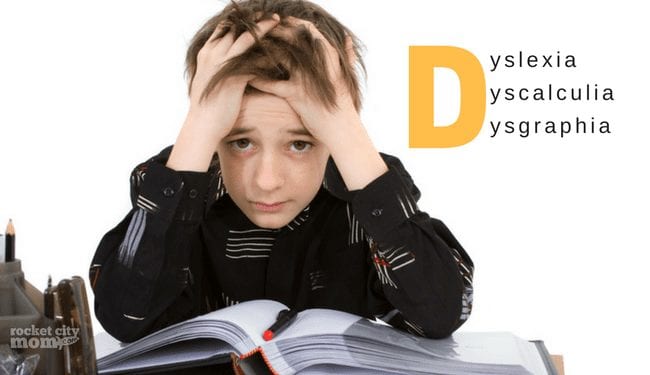The Three D’s of Learning Challenges

When it comes to school, we’re all familiar with the three Rs: reading, (w)riting, & (a)rithmetic. All three are the basis of our education, from our early days learning letters and numbers to later years in high school and even college, writing papers and surviving calculus.
What happens, though, when those subjects don’t come easily? What happens when you watch your child struggle with something that might seem innate to you, but makes your child burst into tears every time? Maybe it’s a learning challenge and – good news – you and your child both have so many options if there is a problem.
Dyslexia
Probably the most well-known learning challenge is dyslexia. Dyslexia causes difficulties recognizing and processing written words. While learning to speak might not be a challenge, learning to read is difficult because it requires a number of skills, such as recognizing letters and their sounds and how they work together, to coalesce into something meaningful. When this process is interrupted, reading becomes a challenge, which can make all schoolwork that much more difficult.
The symptoms of dyslexia can start as early as preschool so it is important to pay attention when your child might struggle with learning a new concept. Dyslexia has a number of symptoms, but some basic ones include:
- Trouble recognizing letters of the alphabet or matching letters to sounds
- Issues with using a developmentally appropriate vocabulary or pronouncing words correctly
- Difficulties with reading or spelling and sounding out unfamiliar words while reading
- Struggles with reading aloud or summarizing a story
- Difficulties understanding word problems or following directions
Like most learning challenges, your child may not demonstrate all of these symptoms, but, if you are concerned, talk to your child’s teachers just in case you need to take action. From there, you can talk to your pediatrician and find a specialist that can diagnose dyslexia and then help you with strategies for your child. Once you have a diagnosis, many resources are out there for making school less of a struggle and promoting learning based on your child’s abilities and challenges.
Dyscalculia
Lesser known, but suspected to possibly be as common as dyslexia, is dyscalculia. This learning challenge manifests as difficulties with number and math concepts; children may know to do with numbers, but they may not understand why they’re doing it. As with any learning challenge, children with dyscalculia will not have all of the same symptoms, but some will show as early as preschool.
- Issues learning to count or recognizing the connection between the number 7 and the word seven
- Difficulties recognizing patterns and sorting items by a certain parameter, such as shape or color
- Difficulties remembering basic math facts and recognizing math symbols
- Struggles with differentiating right from left or remembering phone numbers and scores
- Issues finding his or her way around or participating in activities that require estimating distances or speeds, such as driving
This list is just a few of the symptoms that you might recognize in your child. If you suspect something like dyscalculia, talk to your child’s teachers to see if they’re noticing the same symptoms that you are. Having that information will be helpful when you talk to your pediatrician about the process of diagnosing dyscalculia.
Dysgraphia
Does your child have messy handwriting and problems with spelling or putting thoughts on paper? Do you see them struggle with drawing shapes or holding their pencil the right way? These are a couple of the symptoms of dysgraphia, another learning challenge that may not be as well-known as others, but nevertheless still a concern, especially in those early years when children are learning to how to write.
Dysgraphia involves an interruption in the process of getting information from either short- or long-term memory organized enough to put it down on paper. Your child might have issues recalling the information or trouble getting that information down on paper, whether it’s handwritten or typed. Like reading, writing is an essential part of our education, even in classes such as math; recognizing the symptoms as early as possible can be essential to getting your child help.
- Trouble with letter spacing and organizing words on the page from left to right
- Difficulties reading a map or drawing shapes
- Issues with using scissors or holding arm or paper in an awkward position while writing
- Trouble with maintaining train of thought while writing or following directions
- Difficulties in writing with complexity or using correct grammar and punctuation
Learning challenges like dysgraphia often manifest in different ways in different children so take care to observe your child and collaborate with teachers on any concerns you or they might have about how your child is doing at school. If you suspect a problem, talk to your pediatrician about finding a professional that can help you determine what diagnosis is appropriate and what strategies will help you and your child most.
Suspect a Problem?
As parents, we are our children’s advocates until they are ready to use their voices for themselves. You might find it tough to admit that your child might need help, but, if your parental spidey-sense is tingling, pay attention to that. You will find that we now have much more information about learning challenges, their diagnosis, and appropriate strategies for dealing with them than ever before. Schools are required to help students with any learning challenge and the help your child will receive will depend on where he or she needs help most.
Often, children with other issues, such as ADHD, will have additional challenges like dyscalculia or dyslexia. Because of this, it is essential to use a licensed professional who is familiar with the differences between how issues such as ADHD and challenges like dyscalculia present so that your family can get the most accurate diagnosis possible.
If you suspect an issue, regardless of your child’s age, start today by talking to teachers and others your child works with from day to day. Talk to your pediatrician about symptoms and the diagnostic process. You and your child might be struggling now, but, with more information, you can turn those struggles into a better school experience for both of you in no time.
This post was updated July 2023.
You Might Also Like…
Jennifer Kelly grew up in the Birmingham area, but migrated to Huntsville for graduate school and put down roots after meeting her husband, Jamie. In addition to being a mom to her two boys, she is a tennis ninja, trivia nerd, freelance editor, and aspiring writer. You can visit her at The Sir Barton Project, a blog about her upcoming book.






